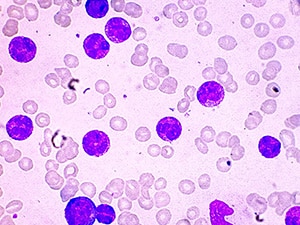First Menin Inhibitor Approved for Certain Acute Leukemias
The FDA approved revumenib, a first-in-class menin inhibitor, to treat acute leukemias with a KMT2A translocation.
The U.S. Food and Drug Administration (FDA) has approved revumenib (Revuforj) for the treatment of adult and pediatric patients 1 year and older with relapsed or treatment-refractory acute leukemia that harbors a translocation involving the lysine methyltransferase 2A (KMT2A) gene.
Revumenib is a targeted therapeutic that inhibits a protein called menin. Menin works together with MLL1, the protein produced by the KMT2A gene, to change how genes are expressed in the cell. Translocations involving KMT2A are common in acute leukemias and can cause the MLL1/menin complex to turn on gene expression patterns that drive cancer. Revumenib blocks this process by preventing menin from interacting with MLL.

This is the first FDA approval for revumenib, and revumenib is the first menin inhibitor to be approved by the FDA.
The approval was based on results from a single-arm cohort of the open-label, multicenter phase I/II AUGMENT-101 clinical trial. Researchers enrolled 104 adult and pediatric patients 30 days or older with acute leukemia that harbored a KMT2A translocation, with the exception of patients whose cancer harbored an 11q23 partial tandem duplication. Patients received revumenib until disease progression, unacceptable toxicity, lack of morphological leukemia-free response after four cycles of treatment, or receipt of a stem cell transplant.
Overall, 21.2% of patients experienced a complete remission or a complete remission with partial hematopoietic recovery, meaning no signs of cancer remained, but abnormalities in blood cell counts persisted. The median time to remission for these patients was 1.9 months, and remissions lasted a median of 6.4 months.
At baseline, 83 patients were dependent upon red blood cell or platelet transfusions, and 12 of them became independent of transfusions during any eight-week period after baseline. At baseline, 21 patients were not dependent upon red blood cell or platelet transfusions, and 10 of them remained transfusion-independent during any eight-week period after baseline.
The recommended dose of revumenib is 270 mg orally twice a day for patients weighing 40 kg or more who are not receiving strong CYP3A4 inhibitors. For patients weighing less than 40 kg not receiving strong CYP3A4 inhibitors, the recommended dose is based on body surface area and is 160 mg/m2 given orally twice a day. Dosing must be adjusted for patients also taking strong CYP3A4 inhibitors.
Leukemia is a type of blood cancer that occurs when the bone marrow makes abnormal blood cells that can crowd out healthy blood cells and make it difficult for them to function properly. Acute leukemias—commonly acute lymphoblastic leukemia (ALL) and acute myeloid leukemia (AML)—grow relatively quickly and are marked by an accumulation of immature blood cells.
According to federal statistics, it was estimated that 62,770 individuals would be diagnosed with leukemia and 23,670 patients would die of the disease in the United States in 2024.
The FDA rendered its decision on November 15, 2024. Check this resource for updated information on all therapeutics regulated by the FDA.
